
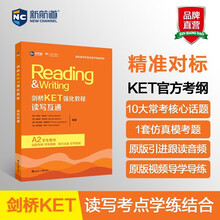
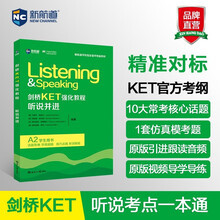
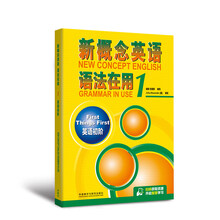
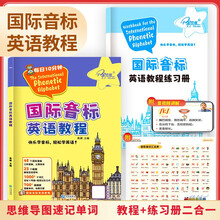
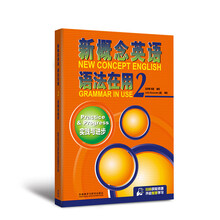

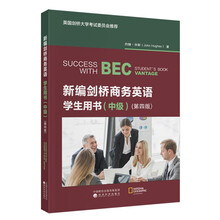
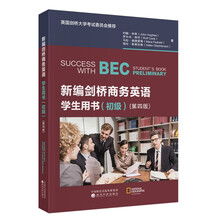
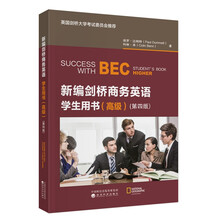
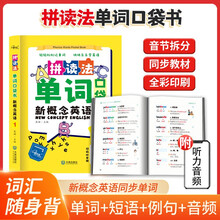
《张继承实战英语(高级版)(全3册)》是张继承老师千锤百炼的外交、外企、旅游和办学经验及与无数外宾交流的实战心得。《张继承实战英语(高级版)(全3册)》内容丰富,实战性强,涵盖面广,采用双色印刷,版式新颖夺目,包装精美,令人爱不释手,具国际品味。《张继承实战英语(高级版)(全3册)》将帮助你征服英语,改写“聋哑英语”的尴尬史!
《张继承实战英语(高级版)(全3册)》封面图片为单册,套装图片请以实物为准!
实战英语以人为本,以实用为目的,以实战为灵魂,以“全面训练,听说领先,突出实战”为特点,以RPP教学“三步曲”、TQQ学习“三定律”为步骤。以“一个理念、一个目标、一个中心、一条规律、两大板块、六大内容和九大交际法”为整体构架、实战英语是一种助国人超越知我。彻底告别“聋哑”困境,全面攻克英语革命性的学习方法。让你的英语形同母语,让英美人认你是同乡,精彩内容大回放:22大热门话题、1200个经典词汇、66篇经典文章、6大组成部分、22个话题扫描。
Automobiles
The new rules will cut import tariffs on automo- biles to 25 percent by mid-2006 from the present 80-100 percent, under the U.S. agreement. The rules require China to lift all restrictions on catego- b ry, type and model of vehicles produced in Sino- EU joint -ventures within two years.
China plans to cut import tariffs to 60 -80 per- cent in the next two years as the first step in duty cuts. The domestic auto industry is expected to be one of the most affected sectors. Cheaper imports could also affect foreign auto joint ventures, such as Shanghai General Motors and Shanghai Volk- swagen. Domestic automakers also face competi- tion from a sharp rise in car and auto parts im- ports, encouraged by steep cuts in tariffs.
Banking
Foreign banks will be allowed to conduct do- mestic yuan currency business with Chinese firms two years after WTO accession and with Chinese individuals five years after accession, the U.S.
deal says, geographic restrictions will be lifted after five years.
Foreign banks will make inroads in yuan busi- ness in major cities like Shanghai and Beijing, bJ will not pose an immediate threat to the Big Four state banks, which have vast branch networks and a market share of more than 70 percent. Domestic banks will lose staff to foreign rivals. Smaller com- mercial banks may bear the brunt of competition. The new rules have pushed the banking sector to expand services, create cooperative pacts, list on the stock market, get rid of bad debts and merge ith other banks to cope with the challenges of for- eign competition.
Financial Securities
The new rules will permit minority foreign- owned joint ventures to engage in fund manage- ment on the same terms as Chinese firms. Three years after accession, foreign firms will be allowed
49 percent stakes in joint ventures.
Young domestic brokerages are seeking part- nerships with foreign securities houses to make use of their expertise and capital strength. China Inter- national Capital Corp., a joint venture investment bank of China Construction Bank and Morgan Stan- ley Dean Witter, is expected to fare well in under- writing domestic and overseas share offerings and other investment banking services. Already, foreign fund managers are linking up with domestic firms, providing foreign know-how for running mutual funds, a first step towards setting up joint venture fund management companies in China.
Insurance
The new rules will limit foreign stakes to 50 percent. The EU has said the insurance market would be opened two years earlier than outlined in the U.S. agreement. The U.S. deal calls for Bei- jing to phase out geographical restrictions in three years, to allow foreign insurers into group, health and pensions over five years, and permit wholly owned non-life subsidiaries in two years. Foreign insurers are now largely restricted to Shanghai and
Guangzhou.
European insurers, offered seven new busi- ness licenses, are the big winners. Two of the li- censes have been issued. Domestic insurers, no~ enjoying a 99 percent market share, will face strong competition from foreign firms. China has granted licenses to 16 foreign insurers, including five U.S. firms and seven from Europe. Some U.S. Insurers, such as American International Group, hold more than one license.
Agriculture
Under the new rules, duties for agricultural products will fall from 22 percent to 17.5 percent for most countries. The new rules will cut import tariffs on products such as cooking oil, butter, or- anges and wine from the present 25 to 85 percent to 9 to 18 percent.
China has already accepted the first shipments of U.S. pork and beef. China s producers will face major challenges because tariff cuts and freer im- port quotas will mean domestic grains like corn and soybeans must compete with higher quality im- ports. Cheaper meat imports will threaten the local livestock industry.
……